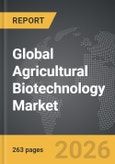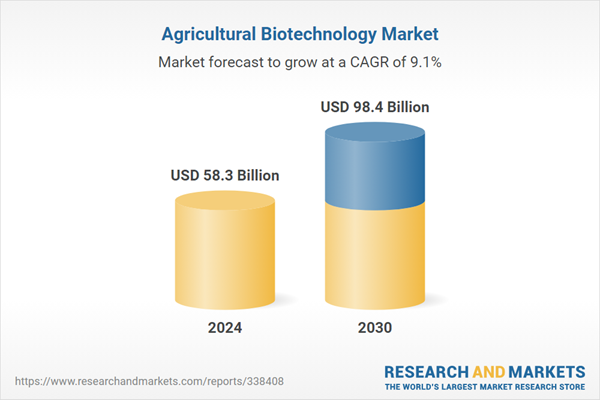Global Agricultural Biotechnology Market - Key Trends and Drivers Summarized
What Is Agricultural Biotechnology and How Is It Shaping Modern Farming?
Agricultural biotechnology is a dynamic field that applies techniques of biotechnology to enhance the productivity and sustainability of agriculture. This science involves the use of genetic engineering, molecular markers, molecular diagnostics, vaccines, and tissue culture to modify living organisms: plants, animals, and microorganisms. Crop biotechnology has enabled the development of plant varieties with desired traits such as increased yield, resistance to pests and diseases, and enhanced nutritional content. Genetically modified (GM) crops like corn, soybeans, and cotton that exhibit insect resistance and herbicide tolerance are now extensively cultivated globally. This technological leap has not only increased farm efficiency but also reduced the use of chemical pesticides and fertilizers, thereby decreasing the environmental impact of traditional farming practices.How Are Genetic Innovations Contributing to Sustainability in Agriculture?
The role of genetic innovations in promoting sustainability in agriculture is pivotal. Through the use of agricultural biotechnology, scientists are able to create crops that can withstand harsh environmental conditions like drought, salinity, and extreme temperatures. These developments are particularly crucial in the face of climate change, which threatens to disrupt crop production worldwide. For instance, drought-tolerant maize and flood-resistant rice are helping farmers in vulnerable regions maintain their yields despite variable weather patterns. Additionally, biotechnology is being used to enhance the nutritional quality of crops, such as golden rice, which has been genetically modified to produce beta-carotene, a precursor of vitamin A, addressing malnutrition in regions where rice is a staple food. These innovations not only contribute to food security but also support the transition towards sustainable agricultural systems that are less dependent on non-renewable resources.What Challenges and Ethical Considerations Surround Agricultural Biotechnology?
Despite its benefits, agricultural biotechnology raises significant ethical and safety concerns that influence public perception and regulatory policies. One of the primary concerns is the potential for genetically modified organisms (GMOs) to cause unintended harm to other organisms or the environment. This includes the transfer of allergenic genes, and the possibility of GMOs crossing with wild plants to create 'super weeds.' Additionally, there are concerns about the economic impact of GM crops on smallholder farmers, particularly in terms of dependency on proprietary seeds and the associated legal and financial constraints. These challenges necessitate stringent regulatory frameworks to ensure that biotechnological advancements in agriculture are safe, ethical, and equitable. Public acceptance is also crucial and is shaped by transparent communication of the scientific evidence supporting the safety and benefits of GM products.What Drives the Growth in the Agricultural Biotechnology Market?
The growth in the agricultural biotechnology market is driven by several factors, reflecting the increasing global demand for food, feed, and fiber. Technological advancements that enhance crop yield and resilience are essential as the world's population continues to grow and arable land decreases. The rising prevalence of biofuels also propels the development of bioengineered crops that are optimized for energy production. Furthermore, consumer behavior is increasingly influenced by environmental and sustainability concerns, driving demand for more 'natural' and resource-efficient farming practices. Governments and international bodies are also playing a crucial role by funding research in agricultural biotechnology to secure food production systems and promote environmental sustainability. Economic development in emerging countries is another driver, boosting local research capabilities and adoption of biotech crops to ensure food security and agricultural productivity. Together, these factors are enhancing the integration of biotechnology in agriculture, promising a future of farming that is both productive and sustainable.Report Scope
The report analyzes the Agricultural Biotechnology market, presented in terms of market value (USD). The analysis covers the key segments and geographic regions outlined below.- Segments: Type (Molecular Diagnostics, Tissue Culture, Vaccines, Genetic Engineering, Other Types); Application (Transgenic Crops, Synthetic Biology-enabled Products, Other Applications).
- Geographic Regions/Countries: World; United States; Canada; Japan; China; Europe (France; Germany; Italy; United Kingdom; and Rest of Europe); Asia-Pacific; Rest of World.
Key Insights:
- Market Growth: Understand the significant growth trajectory of the Transgenic Crops Application segment, which is expected to reach US$76.4 Billion by 2030 with a CAGR of 9.4%. The Synthetic Biology-enabled Products Application segment is also set to grow at 7.8% CAGR over the analysis period.
- Regional Analysis: Gain insights into the U.S. market, valued at $15.8 Billion in 2024, and China, forecasted to grow at an impressive 8.6% CAGR to reach $15.2 Billion by 2030. Discover growth trends in other key regions, including Japan, Canada, Germany, and the Asia-Pacific.
Why You Should Buy This Report:
- Detailed Market Analysis: Access a thorough analysis of the Global Agricultural Biotechnology Market, covering all major geographic regions and market segments.
- Competitive Insights: Get an overview of the competitive landscape, including the market presence of major players across different geographies.
- Future Trends and Drivers: Understand the key trends and drivers shaping the future of the Global Agricultural Biotechnology Market.
- Actionable Insights: Benefit from actionable insights that can help you identify new revenue opportunities and make strategic business decisions.
Key Questions Answered:
- How is the Global Agricultural Biotechnology Market expected to evolve by 2030?
- What are the main drivers and restraints affecting the market?
- Which market segments will grow the most over the forecast period?
- How will market shares for different regions and segments change by 2030?
- Who are the leading players in the market, and what are their prospects?
Report Features:
- Comprehensive Market Data: Independent analysis of annual sales and market forecasts in US$ Million from 2024 to 2030.
- In-Depth Regional Analysis: Detailed insights into key markets, including the U.S., China, Japan, Canada, Europe, Asia-Pacific, Latin America, Middle East, and Africa.
- Company Profiles: Coverage of players such as ADAMA Agricultural Solutions Ltd., BASF SE, Bayer CropScience AG, Certis USA LLC, Dow AgroSciences LLC and more.
- Complimentary Updates: Receive free report updates for one year to keep you informed of the latest market developments.
Some of the 17 companies featured in this Agricultural Biotechnology market report include:
- ADAMA Agricultural Solutions Ltd.
- BASF SE
- Bayer CropScience AG
- Certis USA LLC
- Dow AgroSciences LLC
- DuPont Pioneer
- Marrone Bio Innovations Inc.
- Monsanto Company
- Performance Plants Inc.
- Syngenta AG
- Valent BioSciences Corporation
This edition integrates the latest global trade and economic shifts into comprehensive market analysis. Key updates include:
- Tariff and Trade Impact: Insights into global tariff negotiations across 180+ countries, with analysis of supply chain turbulence, sourcing disruptions, and geographic realignment. Special focus on 2025 as a pivotal year for trade tensions, including updated perspectives on the Trump-era tariffs.
- Adjusted Forecasts and Analytics: Revised global and regional market forecasts through 2030, incorporating tariff effects, economic uncertainty, and structural changes in globalization. Includes historical analysis from 2015 to 2023.
- Strategic Market Dynamics: Evaluation of revised market prospects, regional outlooks, and key economic indicators such as population and urbanization trends.
- Innovation & Technology Trends: Latest developments in product and process innovation, emerging technologies, and key industry drivers shaping the competitive landscape.
- Competitive Intelligence: Updated global market share estimates for 2025, competitive positioning of major players (Strong/Active/Niche/Trivial), and refined focus on leading global brands and core players.
- Expert Insight & Commentary: Strategic analysis from economists, trade experts, and domain specialists to contextualize market shifts and identify emerging opportunities.
Table of Contents
Companies Mentioned (Partial List)
A selection of companies mentioned in this report includes, but is not limited to:
- ADAMA Agricultural Solutions Ltd.
- BASF SE
- Bayer CropScience AG
- Certis USA LLC
- Dow AgroSciences LLC
- DuPont Pioneer
- Marrone Bio Innovations Inc.
- Monsanto Company
- Performance Plants Inc.
- Syngenta AG
- Valent BioSciences Corporation
Table Information
| Report Attribute | Details |
|---|---|
| No. of Pages | 263 |
| Published | January 2026 |
| Forecast Period | 2024 - 2030 |
| Estimated Market Value ( USD | $ 58.3 Billion |
| Forecasted Market Value ( USD | $ 98.4 Billion |
| Compound Annual Growth Rate | 9.1% |
| Regions Covered | Global |









